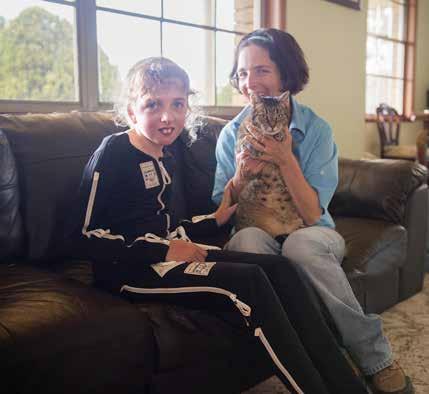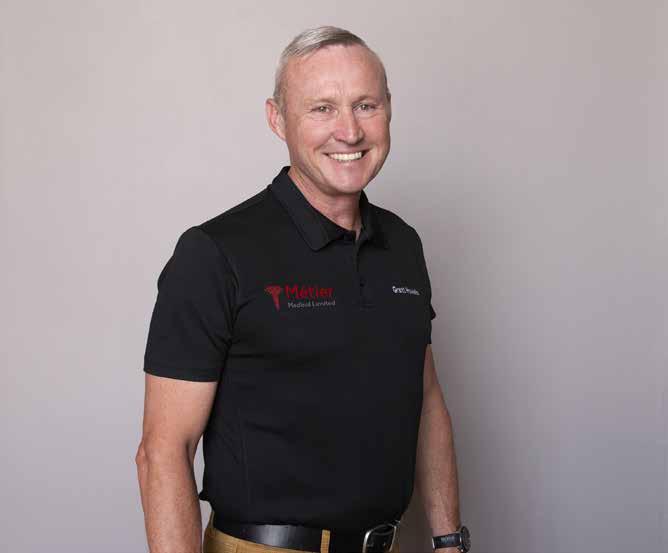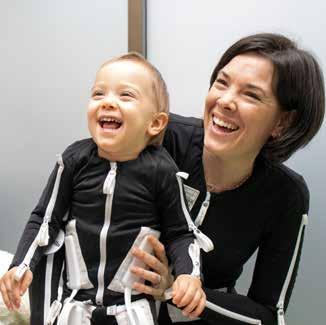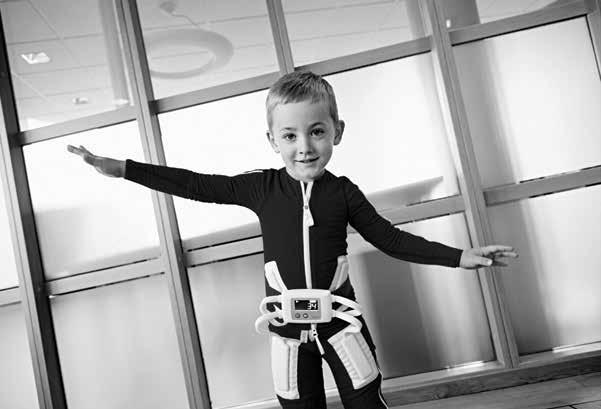
7 minute read
The Miraculous Mollii Suit – Giving Hope to Sufferers
▲ Chloe and her mum Nancy Dent
WORDS : NATHALIE CRAIG
Advertisement
CHRONIC PAIN SUFFERERS ARE FINDING SOME RELIEF, THOSE WITH MOTOR DISABILITIES ARE MOVING MORE FREELY, ATHLETES ARE FINE-TUNING THEIR PERFORMANCE, AND IT’S ALL THANKS TO ONE REVOLUTIONARY INVENTION, THE MOLLII SUIT.
The Mollii Suit – an innovative therapeutic garment, which was first launched in Sweden in 2010, has been brought right here to the Hunter after being imported to Australia and New Zealand by Maitland-based company Métier Medical Limited.
The electro-stimulation suit was created by Swedish chiropractor Fredrik Lundqvist who was working to help rehabilitate patients with neurological disabilities, at the time. He experimented with putting electro-stimulation into clothing to help treat people with cerebral palsy, stroke, spinal cord injury, acquired brain damage and other diagnoses that lead to motor disabilities.
The Mollii Suit then appeared on Sweden’s Dragons’ Den, where entrepreneurs pitch their business ideas to five potential investors. All five investors were in after they witnessed the way the suit increased the mobility of a young girl with cerebral palsy.
The comfortable two-piece suit looks a bit like a wetsuit with a zipper down the front. It has a detachable control unit which can be programmed to activate up to 58 electrodes embedded in the suit. The suit emits a mild, low-frequency electro-stimulation programmed explicitly to the needs of the individual. It is designed to trigger reciprocal inhibition, the body’s own reflex, to reduce the tension in the spastic muscle and to help voluntary movement. This helps relax spastic, tense and aching muscles improving mobility, balance and blood circulation and achieving pain relief.
The suit is designed to be worn every day or every second day for one hour at a time.

Grant Howells, Métier Medical Limited
Grant Howells, CEO of Maitland’s Métier Medical Limited, said the opportunity to work with the creators of the Mollii Suit had been nothing short of a privilege.
“Métier Medical is proud to bring to Australia this revolutionary neurorehabilitation device with the potential to change lives,” he said.
Grant said he first came across the Mollii Suit during a trip to the UK in 2015, and it totally blew him away.
“In a UK hospital, there was a guy who had been hit by a car and had a spinal injury,” Grant explained.
“He was in a wheelchair, and he couldn’t walk without being supported. After being in the suit for an hour, he pretty much got out of the wheelchair by himself,” he said.
“Straightaway, I thought, we’ve got to take this to Australia”.
Shortly after this experience, Grant flew to Sweden to find out more about the Mollii Suit.
After seeing the amazing results the Mollii Suit could achieve, Grant knew it was his mission to market the suit back home, and Métier Medical now has the rights to the suit in Australia and New Zealand.
“I’m probably biased, but the Mollii Suit is the most amazing thing I’ve come across in my whole life. I’ve never cried so much in my life as I have in the last five years, seeing the results people have with the suit,” Grant said.
A local example of the suit making a difference to a person's quality of life can be seen in Newcastle woman Kristi Durrance. Kristi suffered a brainstem stroke in February 2018 that has significantly impacted her movement and speech.
As part of her therapy, Kristi trialled the Mollii Suit for two months for one hour in the morning and one hour in the afternoon.
“I noticed my legs were bending much better, my grip with my hands was much better, and my sleep was much better,” she said.
After the trial ended, Kristi noticed these improvements slip away again. Luckily she was able to secure a Mollii Suit for herself in November 2020, which she now wears for an hour each day.
As soon as she started using the Mollii Suit again, Kristi’s “severe back pain went away overnight”.
“I sleep 9 to 5 each night. Prior to the suit, I would sleep terribly; I’d just lay there,” she said.
Another woman whose life has been positively impacted by the Mollii Suit is Nancy Dent from Wallabadah in regional NSW.
Her daughter Chloe was diagnosed with a Global Functional Disability very early in her life, leaving her in unknown territory. She didn’t take her first step until she was over two and her cognitive ability was impaired. Nancy said it wasn't until Chloe first tried the Mollii Suit in 2018 that things truly started to change for her.
“Chloe will be turning ten next week, and I am very grateful for the Mollii Suit,” she said.
“In the last three months, her reading and writing have improved at school, her speech is clearer, and she is able to put more words together,” Nancy said. F

“Her coordination has improved, she can bounce a ball from left to right hand, and we can play handball. We got her a basketball net, and now we are shooting hoops- her arms go above her head.”
“She is changing clothes many times a day and is becoming a real little girl; I know this because she now likes to look at herself and do fancy moves in front of the window to see herself.”
“She is organising herself and is planning what she needs. The only negative thing I can say is she has an amazing memory, and I can’t get away with anything anymore,” she laughed.
Grant believes that there is so much untapped potential when it comes to who the Mollii Suit could help.
“We are only just scratching the surface of who it could benefit,” he said
Grant also loaned a Mollii Suit to a little girl suffering from Shaken Baby Syndrome (which resulted in her having no memory).
“I offered her a trial of a Mollii Suit, and because it emulates your body's electric current, it can stimulate neurological pathways and 'open up' the brain,” he said.
“After a week, it switched on her brain. The little girl now remembers who she played with that day, she can tell you what she did, and just recently she even topped her year in spelling,” he said.
Several case studies have been published showing positive results from using the Mollii Suit on patients needing therapy for stroke, cerebral palsy, acquired brain injury, spinal cord injury, multiple sclerosis and chronic pain. This includes several university and hospital-backed studies from around the world.
One of the major studies was an independent review of research on the neurophysiological mechanisms the Mollii Suit uses and how it can be applied clinically for spasticity and dystonia, as well as pain relief. The review was carried out by Dr Pennati, MD, PhD student and colleagues, within the Karolinska Institutet, Stockholm, Sweden and was completed in October 2017 after receiving funding from the Swedish Government innovation agency. It gives a comprehensive explanation of how the Mollii Suit’s subthreshold, electro-stimulation works based on current, relevant and independent research.
Grant said that more recently, Mollii has also had positive impacts on sports performance and recovery. In addition, Mollii has been effective in reducing acute and chronic pain, providing practitioners and clients with a new, complementary tool to existing therapies.
“Hopefully, we can broaden its intended use, and we are leading the way on that,” Grant said.
Every day Grant and his team continue to learn even more about what Mollii can do.
“I just want to get it out there. We offer free trials and anyone interested can simply phone us,” he said.
Health professionals are welcome to attend Mollii sessions with their clients. The Mollii Suit is ideal to use alongside existing therapy programs.
The residual benefit of a 60-minute treatment can last up to 48 hours, and has an accumulative effect whereby you can keep improving on your baseline. Mollii therapy can easily be repeated in the home environment.
The suits are often on a hired arrangement to start with, or they can be purchased outright.
Métier Medical is a Registered NDIS Provider.
“Securing the NDIS funding has been a game-changer for us,” Grant said.
“We believe everybodii needs a Mollii.”
Those interested in trialing the Mollii Suit free of charge can phone 1300 315 530, email info@molliiaustralia.com.au or visit www.molliiaustralia.com.au for more details.









